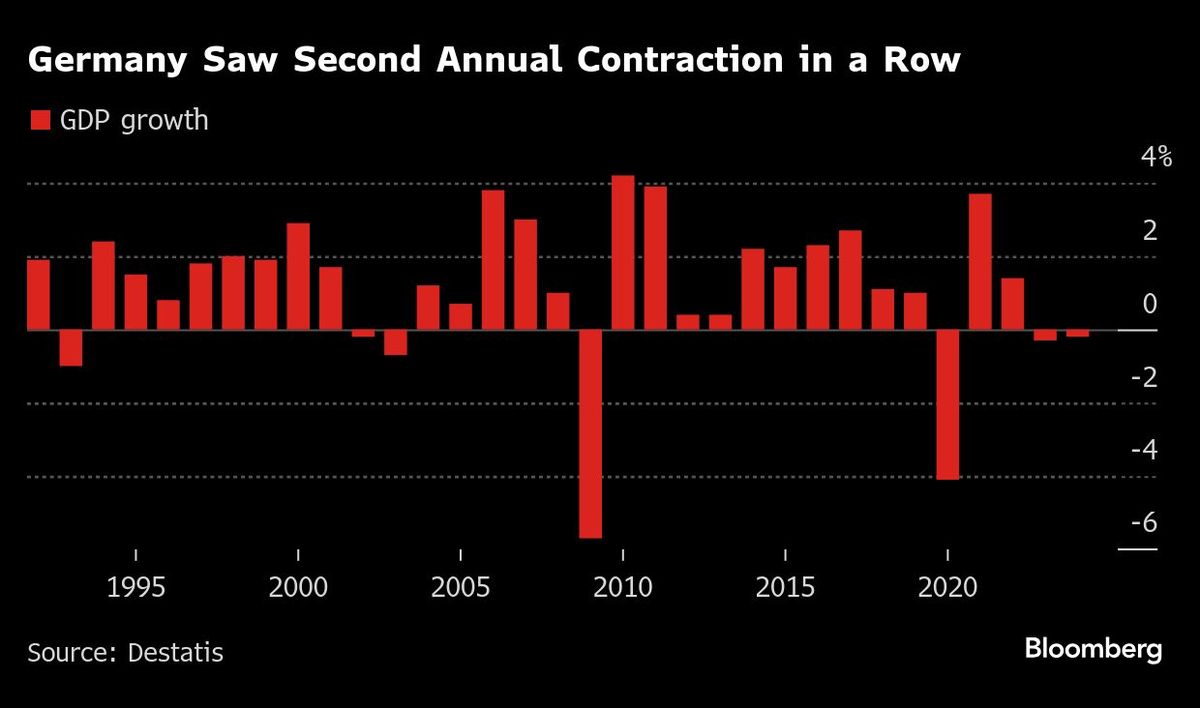
The German statistics office said on Wednesday its gross domestic product (GDP) fell by 0.2% last year, after dropping 0.3% in 2023. It’s only the second time since 1950 that output has contracted for two years in a row.
(Jan 15): Germany’s economy shrank for a second consecutive year in 2024 and is unlikely to grow much in 2025, laying bare the challenge for the country’s new government once snap elections are held in February.
Gross domestic product (GDP) fell by 0.2% after dropping 0.3% in 2023, the statistics office said on Wednesday. It’s only the second time since 1950 that output has contracted for two years in a row.
The struggles of the continent’s largest economy are an overriding theme of an election that many hope will bring more growth-oriented policies capable of helping drag the 20-nation eurozone out of its own rut.
But few foresee quick fixes to issues that include weak global demand, a manufacturing malaise — particularly among carmakers — the lingering effects of the energy crisis, stifling red tape and a dearth of skilled workers.
“Germany is going through by far the longest phase of stagnation in post-war history,” said Timo Wollmershäuser, who heads forecasting at the Ifo institute. “It is also falling behind considerably in an international comparison.”
Ifo predicts “barely perceptible” growth of 0.4% this year.
Germany was the only Group of Seven economy to shrink in 2023 and is the first to publish full-year numbers for 2024. Its prospects for 2025, however, remain bleak. The Bundesbank predicts growth of just 0.2% and warns that another contraction is even possible if US president-elect Donald Trump follows through on his tariff threats.
“Political turmoil at home and the threat of tariffs from the US are likely to weigh on Germany’s economic activity, resulting in only very modest growth. Risks to the outlook are skewed to the downside and major woes in the important manufacturing sector could easily push the country back into recession territory,” says Martin Ademmer, economist at Bloomberg Economics.
Economic decline and squabbling over how to arrest it were big factors in the downfall of Germany’s three-party coalition in November. In the early ballot on Feb 23, Chancellor Olaf Scholz looks set for defeat by Friedrich Merz, who leads the conservative CDU/CSU bloc and is promising fewer regulations and lower taxes.
To get the economy back on track, “we need convincing answers from politicians and companies to the major transformative challenges”, said KfW Research economist Klaus Borger.
How the next government deals with German limits on state borrowing and deficits, known as the debt brake, will be crucial. The stringent rules, long championed by conservative politicians, may be overhauled to allow for more flexibility to fund investments in things like infrastructure, energy and defense.
Germany’s statisticians said fourth-quarter GDP dropped 0.1% from the previous three months — a development that Deutsche Bank economist Robin Winkler described as a worrying surprise.
“If this were to be confirmed, the German economy would have lost momentum again at the beginning of winter,” he said.
The country isn’t alone in Europe in enduring a rough patch. France, the euro area’s No 2 economy, is grappling with fiscal and political upheaval that will require years of belt-tightening that’s likely to weigh on growth.
A rare bright spot is European Central Bank monetary policy, with officials in Frankfurt set to continue lowering interest rates after cutting them four times in 2024.
Uploaded by Felyx Teoh
- SumiSaujana slumps on ACE Market, on course to be worst IPO debut
- Asian stocks tumble again as US hits China with 104% tariffs, Treasuries slammed
- US slaps higher taxes on small parcels in tit-for-tat trade war
- Malaysian palm oil producers could capture US market share from Indonesia with better pricing — CGS International
- US stocks take another roller coaster ride on US-China threats
- Khee San says its facilities are fully operational now that gas supply has been restored
- UK could nationalise Chinese-owned British Steel, Bloomberg reports
- What two oil firm ads show about where UK regulator draws the line on greenwashing
- Nintendo’s Switch 2 sales forecast cut by researcher over Trump tariffs
- Poultry players trade below long-term average as egg subsidy removal looms

